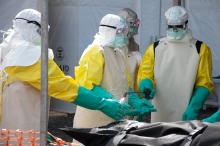Foreword: PSI Health Priorities and Trade Union Response to the Ebola Virus Disease

by Rosa Pavanelli, PSI General Secretary
 Health is best delivered by public services that are accountable to public authorities, based on a public service ethos and the principle of equity without regard to ability to pay. The practice of outsourcing and privatization is based on the belief that the private sector will be more efficient and that public resources will be saved. In reality, privatization is expensive in the medium and long term, upholds profits over other aims, and destroys the social contract and solidarity within a society. The main issue is no longer the health services that a society can afford for its members, but becomes whether each individual can afford the healthcare he or she needs. Increasing numbers of individuals are priced out of access to healthcare, whether through the cost of insurance, or the cost of the services themselves.
Health is best delivered by public services that are accountable to public authorities, based on a public service ethos and the principle of equity without regard to ability to pay. The practice of outsourcing and privatization is based on the belief that the private sector will be more efficient and that public resources will be saved. In reality, privatization is expensive in the medium and long term, upholds profits over other aims, and destroys the social contract and solidarity within a society. The main issue is no longer the health services that a society can afford for its members, but becomes whether each individual can afford the healthcare he or she needs. Increasing numbers of individuals are priced out of access to healthcare, whether through the cost of insurance, or the cost of the services themselves.
In numerous countries, the wages of health service workers are grossly inadequate relative to the qualifications that they bring to the job. This stimulates the push to migrate to countries where wages for healthcare workers are higher. Nevertheless, the fact of health worker migration has a downward pressure on wages in the health sector in receiving countries.
The occupational health and safety of healthcare workers are unevenly protected and promoted; international standards need to be more widely ratified, national standards implemented, and specific protective practices included in collective bargaining instruments at the workplace or branch level. These efforts must be made in opposition to the general contrary trend to reduce occupational health and safety as a savings measure. Shortages of staff, inadequate skill mixes at the health delivery point, and under-practiced teams are occurring increasingly due to cuts in public spending and/or private sector efficiency drives. These shortages, cuts and efficiencies lead to longer wait-times for patients and stressful workplace environments for health workers.
The global economy is projected to create around 40 million new health sector jobs by 2030; mostly in middle- and high- income countries. Despite the anticipated growth in jobs there will be a projected shortage of 18 million health workers to achieve and sustain the Sustainable Development Goals primarily in low and lower-middle income countries. The rising global demand and need for health workers, over the next fifteen years, presents significant challenges. Importantly, it also offers the opportunity to generate employment, in areas where decent jobs are most needed. PSI represents trade unions, health and public service workers on the newly created United Nations Commission on Health Employment and Economic Growth (ComHEEG). PSI and its affiliates contributed to the work of the Commission with a focus on the human right to health, the importance of well-funded and well-staffed public health systems, and decent working conditions for health workers. The report of the Commission, its follow-up and five-year action programme present PSI with an opportunity to continue to influence global health policies and work closely with all relevant international organizations as well as affiliates around the world joining in a global campaign on the human right to health.
“Given the demands of achieving the Sustainable Development Goal of Universal Health Coverage, work in health will require major transformations, including substantial increases in the numbers of healthcare workers. Governments have the core responsibility for education and employment in the health sector and the ultimate accountability to ensure the human right to health through universal access to healthcare, founded on availability, affordability, acceptability and quality. There is growing recognition of the need to restructure the international taxation system to capture immense revenues that are systematically avoided and evaded. The implementation of global tax reforms could provide significant gains for government budgets. Health should be one of the highest priorities for the expenditure of such revenues, given the benefit of investment in health and the associated returns to the economy, productivity and employment. “
“Unfortunately the recent Ebola and Zika Virus epidemics are totemic of the lessons we are failing to learn on a global level. These lessons talk of the need for adequate numbers of well-trained healthcare workers who are appropriately resourced. They talk of the need for regulation, and more importantly accountability and enforcement of these regulations, within healthcare systems and they speak of the need for a whole government / societal approach in both preventative and reactive situations; the need for robust and coordinated services at the primary, acute and post-acute service levels.”
All of the challenges described above come together in the Ebola Virus Disease (EVD) outbreak, which spread uncontrollably in Guinea, Liberia and Sierra Leone revealing the structural and systemic weaknesses of the health systems in these countries, caused by decades of lack of investment in public health systems. Deplorable working conditions, lack of occupational health and safety for health workers, a refusal by the government to recognize the health workers’ unions and listen to their calls for help on the ground, all led to known catastrophic results and potential global calamity.
In response, PSI and its affiliates launched the PSI Trade Union Response to the Ebola Virus Disease. PSI actively lobbies national governments, the ILO and WHO and works with health and allied care workers in our unions to rebuild health systems that can resist future outbreaks in the context of universal access to essential healthcare. In this report we share some of the findings and results of our work.
-
Read the publication on-line
-
Download a PDF of "PSI's Trade Union Response to the Ebola Virus Disease"
-
More on the PSI's Ebola response
-
Also see PSI's work on Health and Social care services
In this issue:
- A global view on the impact of Ebola
- Trade union response: the ebola response strategy
- Work on the ground: three national action plans
- The survey: mapping missing wages, hazard fees and family support
- Lobby: visits in the three most affected countries and the United States
- Liberia: trade union rights under attack
- Congo: unite the unions
- Ghana: union involvement

